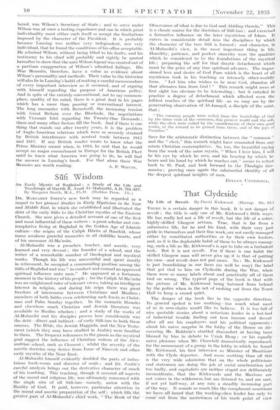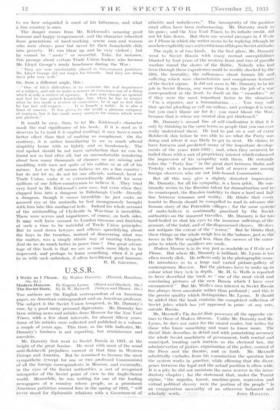That Clydeside
My Life of Revolt. By David Kirkwood. (Harrap. lea. 6d.)
THERE is a certain danger in this book. It is not danger of revolt ; the title is only one of Mr. Kirkv,-ood's little ways. He has really led not a life of revolt, but the life of a sober, highly-skilled Glasgow artisan. True, that is far from a submissive life, for he and his kind, with their very just pride in themselves and their fine work, are, not easily managed, either by constituted authorities or by their own leaders, and, as it is the deplorable habit of these to be always manag- ing, such a life as Mr. Kirkwood's is apt to take on a turbulent look. But it is not revolt. For if there is one habit the skilled Glasgow man will never give up it is that of putting his case—and revolt does not put cases. No : Mr. Kirkwood is just brandishing in our faces (as well he may) the label that got tied to him on Clydeside during the War, when there were so many labels about and practically all of them tied on wrong. The typical page of the book is that with the picture of Mr. Kirkwood being batoned from behind by the police when in the act of rushing out from the Town Hall to keep a crowd quiet.
The danger of the book lies in the opposite direction. Its general upshot is too soothing—too much what most of us in arm-chairs would like to believe.. It is too full of nice quotable stories about a notorious leader in a hot-bed of industrial trouble finding out how human and decent after all are his employers and his political opponents ; about his naive surprise in the lobby of the House on dis- covering Mr. Baldwin's startled discomfort at having been likened by him in debate to Uriah Heap ; or his equally naive pleasure when Mr. Churchill dramatically reproduced, for the amusement of a group in the lobby in which he found Mr. Kirkwood, his first - interview as 'Minister of Munitions with the Clyde deportee. And more soothing than all this is the very wide admission that on the whole politicians and statesmen are doing the job of social amelioration not too badly, and capitalists are neither stupid nor deliberately inconsiderate, that the Kirkwoods and the Maxtons are not voices in the wilderness, but are listened to, and are met, if not yet half-way, at any rate a steadily increasing part of the way. It sounds so much like the complacent assertions We have all heard that the working-class leader has only to come out from the narrowness of his trade point of view
16 see how misguided is most of his bitterness, and what a line country is ours.
The danger comes from Mr. Kirkwood's amazing good humour and happy temperament, and the character inherited from generations of hard-working, serene men and women who were always poor but never let their households slide into poverty. He can blaze up and be very violent. ; but he cannot be " nasty " or resentful. Take, for instance, this passage about certain 'l'rade Union leaders who became Mr. Lloyd George's ready henchmen during the War :
' • " They are now comfortably placed in. GOvernment positions. Mr, Lloyd George did not forget his friends. And they are doing their jobs very well."
Or, from a different angle, this :
One of life's difficulties is to estimate the real importance of a subject, and not to make a matter of. conscience out of a thing which is only a matter of opinion. A Man may change en opinincc and feel he has gained 101(}Wiedge, but, when he has to retract what ho has made a mitter of conscience, he is apt to feel t hat hp has lost self-respect. . . it is largely a habit. It is aiso form of conceit. It has given to die world a glorious company Of martyrs, but it has made many martyrs for causes which were
not glorious." •
It would be easy, then, to let Mr: Kirkwood's character inask the real significance of his book. If it is read as it deserves to be (and it is capital reading), it may have a much better effect than that of making us complacent. On the Contrary, it is rather 'humiliating to see so • much official stupidity borne with so lightly and so handsomely, The real upshot should be not mere satisfaction that we can be found not so bad after all, but an uncomfortable wondering
about how many thousands of chances we are missing and Muddling with men not quite of his calibre or at all of his nature. Let us by all means believe we are a fine country ; but do not let us, do not let our officials, national, local or Trade Union, make it so extraordinarily difficult for some
Millions of our fellow-countrymen to believe it. They tried very hard in Mr. Kirkwood's. own case, but even when they clapped him into a dungeon An Edinburgh Castle--literally a dungeon, though it seems 'incredible—he just cocks • art amused eye at the .umbrella he had incongruously brought with him into this mediaeval hole. Indeed his whole account of the mishandling of Clydeside in War-time is incredible. There were nerves and impatience, of course, on both sides. It may well have seemed to London tiresome and finicking
at such a time to be watchful of Trade Union principles.' But to send down lawyers and officers speechifying about the boys in the trenches; instead of discovering what was the matter, was a simply idiotic way of treating Glasgow.
And do we do much better in peace time ? One great advan- tage of this book is that we are so much more likely to be impressed, and perhaps to learn something, when it is put to us with such unbroken, if often bewildered, good humour.
R. H. Garr.roN.































































































 Previous page
Previous page